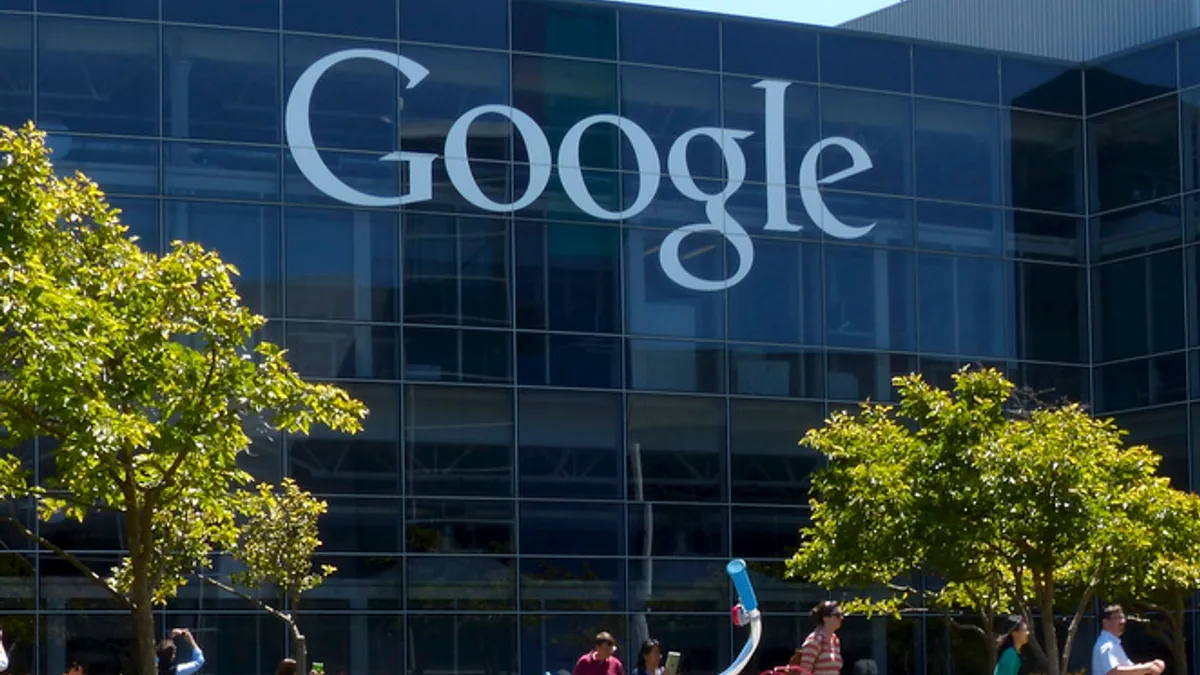Dive Brief:
- Google is opening a new office in Rochester, Minnesota, to bolster its long-term partnership with academic medical giant Mayo Clinic, according to an announcement on Thursday.
- Since the partnership was created one-and-a-half years ago, Google and Mayo have worked to move Mayo's vast amounts of patient data to the cloud and co-develop new artificial intelligence and machine learning tools. Ongoing projects span a variety of areas, including testing AI in radiotherapy for cancer treatment and researching how to leverage advanced computing techniques to fix processing bottlenecks for Mayo.
- In the Rochester office, which will open later this year when state and local public health guidelines allow, Google engineers will work with Mayo researchers, doctors and data scientists. The companies declined to give the size of the office or how many employees would be working there.
Dive Insight:
Big tech has been interested in healthcare for years, as Silicon Valley giants like Amazon, Google, Apple and Microsoft see significant growth potential in leveraging tech to modernize the often clunky industry. Many have partnered with big-name industry incumbents and prestigious health systems as a way to gain access to millions of patient records, get the inside scoop on physician pain points and give their health R&D efforts an aura of authenticity.
Google struck a decadelong partnership with 182-year-old medical system Mayo in 2019. When the partnership was first announced, Google said they planned to open a new office near Mayo's main campus, and is now following through on that promise.
The goal of the business venture is to form an "AI factory" churning out algorithms and other digital products powered by Google in a variety of clinical specialties. It's a growing sector, with the healthcare analytics market expected to reach $50.5 billion globally by 2024, up from $14 billion in 2019.
Currently, Mayo has about 40 teams trained on AI tools, Chris Ross, Mayo Clinic's chief information officer, told reporters during a press conference Thursday.
"We're not at a point where we can share where these are, but they're in a variety of settings for clinical applicability," Ross said.
In late October, Google and Mayo announced the first AI project of their sweeping data partnership: creating an algorithm to improve radiation therapy targeting cancer patients by drawing contours around a neck or head tumor dividing it from healthy tissue, along with tools to help determine dosage and treatment plans.
The tool was built using de-identified data from Mayo Clinic patients receiving care in Florida, Arizona and Minnesota. At the time, the companies said their regulatory experts were exploring potential ways to get approval from the Food and Drug Administration for a medical device incorporating the algorithms, while others researched how the algorithms might be incorporated into the clinical workflow.
That project is still in its early stages, with researchers working to validate the AI's efficacy, Eric Harnisch, senior director of corporate development at Mayo Clinic, said Thursday.
"Those initial results are not in yet, but once we have those we'll start to look at what the validation, the regulatory phases look like and we'll plan to provide more updates as we move that forward," Harnisch said.
Previously, Google researchers have also studied how AI could be used to improve breast cancer screening or detect diabetic retinopathy earlier using eye scans.
However, critics remain skeptical of AI's usefulness in the exam room, with many physicians calling for more oversight of AI-based intelligent and autonomous systems in imaging and diagnostics. And the ventures face thorny privacy and patient consent issues. Google sparked a firestorm of criticism (and a government investigation) in 2019 for using the health records of tens of millions of patients, often without their knowledge or permission, to develop new product lines in tandem with hospital operator Ascension.
A Mayo spokesperson told Healthcare Dive that Google and Mayo researchers only use historical data that has been de-identified, in compliance with patient privacy regulations.
"Data for research projects are used in compliance with the law, Mayo Clinic's privacy policies and ethical standards, for the purpose of advancing care of serious or complex conditions," the spokesperson said.
The two companies have also undergone research into how tech can be used to help with the COVID-19 pandemic response.
A Mayo study released in October said Google searches might help predict COVID-19 hot spots, reporting strong correlations between keyword searches such as "coronavirus symptoms" and "face mask" and outbreaks across the U.S. That data could then be used to allocate resources and medications to the proper areas, researchers said.
Mayo incorporated that Google Trends data as another variable in the system's COVID-19 tracking tool, a platform reporting county-level coronavirus data.
The new space, in a co-working site in downtown Rochester, is Google's first physical office in Minnesota. The Mountain View, California-based company currently has 85 offices in 40 countries, per its website.












